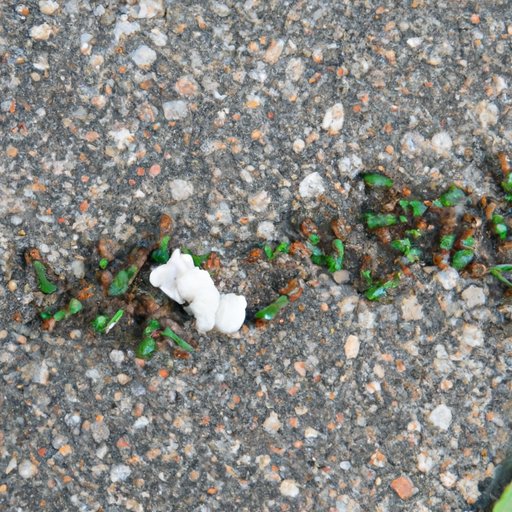
Introduction
Ants are a common sight in many yards, but they can quickly become a nuisance. Not only do they ruin picnics and outdoor gatherings, but they can also damage your yard and garden. Ants can be difficult to get rid of, and many people resort to harsh chemicals to eliminate them. However, there are non-toxic methods that can be just as effective. In this article, we’ll explore how to get rid of ants in your yard using natural, non-toxic methods, professional pest control, DIY insecticide, natural barriers, and prevention techniques.
Non-Toxic Methods
Using natural, non-toxic methods to get rid of ants has many benefits. Not only are these methods safer for the environment and your family, but they are also often more cost-effective. Here are some effective natural methods:
Cinnamon – Ants hate the smell of cinnamon. Sprinkle cinnamon around the areas where ants are entering your yard or home. You can also mix cinnamon with water and spray it directly on the ants to repel them.
White vinegar – Mix equal parts white vinegar and water and spray it around the areas where ants are entering or on ant trails. The strong scent will deter ants.
Homemade ant traps – Mix boric acid with honey or peanut butter to create ant traps. Place them around the areas where ants are entering your yard or home. The ants will be attracted to the bait, but the boric acid will poison them.
When using natural methods, it’s important to use them safely and effectively. Keep pets and children away from the areas where you’ve applied the natural remedies. Also, be patient – these methods often take longer to work than chemical pesticides.
Professional Pest Control
Sometimes, natural methods aren’t effective enough to get rid of ants, and that’s when it’s appropriate to hire a professional pest control service. Here are some tips for finding a qualified and trustworthy pest control business:
Ask for referrals – Ask friends and family for recommendations. Look online for reviews of pest control businesses in your area.
Ensure credentials – Make sure the pest control business is licensed and insured. Ask to see their credentials before hiring them.
Discuss treatment options – Make sure the pest control business discusses treatment options with you and explains the risks and benefits of each one. They should also provide you with a written treatment plan and any safety instructions.
Follow pre-treatment instructions – Before the service visit, make sure to prepare your yard and home as instructed by the pest control business. This may include moving furniture and valuables and clearing clutter.
Follow post-treatment instructions – After the service visit, make sure to follow any instructions provided by the pest control business. This may include staying out of treated areas for a certain amount of time or disposing of contaminated items.
DIY Insecticide
Making your own non-toxic insecticide can be a great option for getting rid of ants in your yard. Here’s a recipe for a simple yet effective DIY insecticide:
Ingredients:
- 2 cups of water
- 1 tablespoon of dish soap
- 10-15 drops of peppermint essential oil
Instructions:
- Mix all the ingredients together in a spray bottle.
- Spray the mixture directly on ants or around ant trails.
- Reapply every few days or as needed.
When storing and using the DIY insecticide, keep it out of reach of children and pets. Label the container with the ingredients and directions for use.
Natural Barriers
Natural barriers can be an effective way to deter ants from entering your yard. Here are some types of natural barriers:
Copper tape or mesh – Place copper tape or mesh around the areas where ants are entering your yard. Ants won’t cross over copper because it zaps them with a small electrical charge.
Diatomaceous earth – Sprinkle diatomaceous earth around the areas where ants are entering your yard. This powder is made from fossilized algae and is sharp enough to damage the exoskeletons of insects, including ants.
Mint leaves – Place fresh mint leaves around the areas where ants are entering your yard. The strong scent will deter ants.
When applying natural barriers, remember that they need to be maintained. Replace the copper tape or mesh if it becomes corroded, reapply diatomaceous earth after rain, and replace mint leaves when they dry out.
Prevention
The best way to get rid of ants is to prevent them from entering your yard in the first place. Here are some simple prevention methods:
Eliminate food and water sources – Clean up food spills and crumbs immediately. Keep trash cans tightly sealed. Fix leaky outdoor faucets and hoses.
Seal entry points – Check the exterior of your home and yard for any holes or cracks where ants can enter. Seal them with caulk or weatherstripping.
Keep your yard clean – Remove any debris, like fallen leaves or twigs, from your yard. Keep pet food and water bowls inside.
By taking these preventive steps, you can reduce the likelihood of ants entering your yard in the first place.
Conclusion
Getting rid of ants in your yard can be a frustrating task, but it doesn’t have to involve harsh chemicals. Using natural, non-toxic methods, professional pest control, DIY insecticide, natural barriers, and prevention techniques are all effective ways to eliminate ants. Remember to use these methods safely and effectively, and to maintain natural barriers and prevent ants from entering your yard in the first place.
If you’re struggling with ants in your yard, give one of these methods a try.




